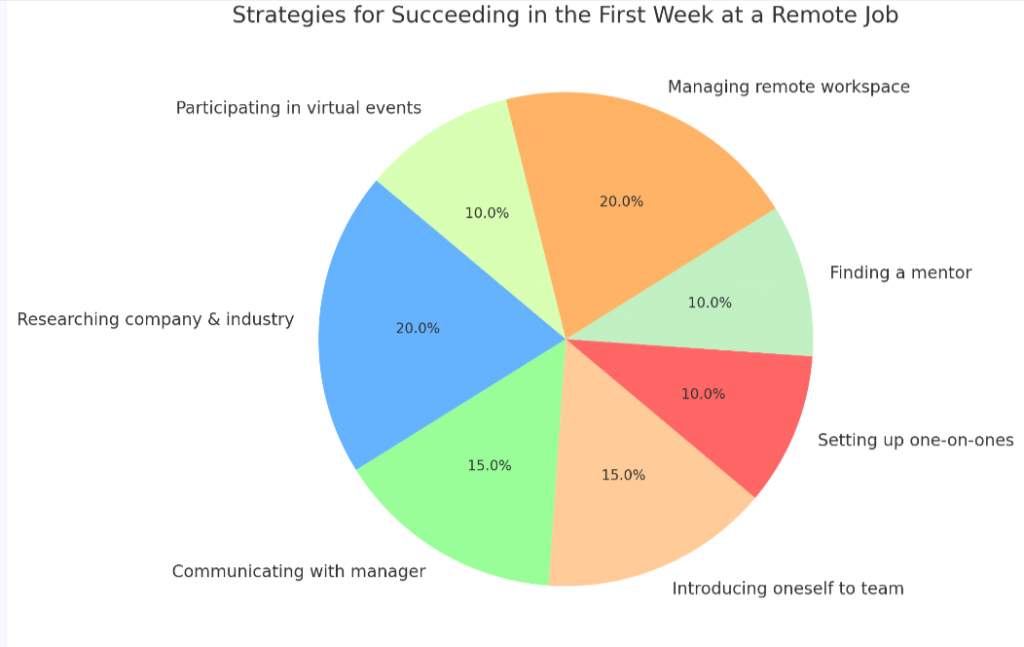Navigating Your First Week in a Remote Social Media Job: A Beginner’s Handbook
Starting a new remote job in social media can feel overwhelming. With traditional office-based onboarding out of the picture, navigating this digital work landscape requires unique strategies and initiative.
This article will provide you with a comprehensive guide highlighting what to expect in your first week as a Remote Social Media Manager, along with key tips for setting yourself up for success.
Let’s dive into an exciting journey that begins from the comfort of your own home!
Key Takeaways
- A remote social media job requires strategizing, engaging, creating, curating, and scheduling content on various platforms like Facebook, Twitter, Instagram, LinkedIn or TikTok.
- To succeed in your first week as a remote social media manager, conduct research on the company and industry trends beforehand.
- Communicate with your manager before starting to establish a positive rapport and clarify expectations for your schedule and tasks.
- Make the most out of your first week by introducing yourself to the team, setting up weekly 1: 1s with key individuals, finding a mentor for guidance, managing your remote workspace effectively, setting expectations with your manager and participating in virtual company events.
Understanding the Role of a Social Media Manager
A social media manager strategizes, engages, creates, curates, and schedules content on various social media platforms.
Strategizing
Strategizing often serves as the backbone of a successful social media manager’s role. It involves creating a comprehensive game plan for online interaction, promotional campaigns, and audience engagement.
The strategy needs to align with the company’s goals and values while effectively reaching its target audiences. This process combines creative thinking with solid data analysis of social media metrics to create impactful content that boosts brand visibility and fosters positive customer relationships.
Good strategizing can also involve experimenting with different types of posts across various platforms such as Facebook, Twitter, Instagram, LinkedIn or TikTok – always keeping track of what works best for your specific audience.
Engaging
Engaging with your audience forms the crux of a Social Media Manager’s role in any organization. A remote position doesn’t differ, rather it adds an extra layer to this crucial task.
Proactive communication sets the foundation for building robust relationships with colleagues and stakeholders alike. In this digital age, various social media platforms serve as effective tools, including LinkedIn, Twitter, Facebook, and Instagram.
Participating actively on these platforms is key to enhancing personal brand images along with promoting corporate culture. This process includes interacting with followers’ posts or replying promptly to their queries and comments.
An essential part of engaging involves setting aside time each day for audience interaction directly on social media platforms. By doing so, you demonstrate a commitment towards creating a thriving community around your brand that fosters stronger ties and ultimately elevates user engagement on your corporate pages.
Creating
Creating attention-grabbing content is a core part of your role as a new Social Media Manager. You’ll need to be proactive, utilizing your skills in Buffer, TikTok, Twitter, Instagram, LinkedIn, Facebook and Google Business Profile among others.
Planning ahead using content calendars will help manage the social media tasks efficiently. It’s not just about crafting beautiful posts; it’s also about incorporating feedback from social media analytics to constantly improve the quality of your work.
Using tools like Meltwater and GrowthHackers can guide you on what type of content resonates most with your audience. Remember that creativity thrives when you allow yourself room for social media experimentation and learning – so don’t shy away from trying something new!
Curating
Curating is an essential duty of a social media manager in any setting, especially when working remotely. This task involves the careful selection and presenting of posts that resonate with your audience’s preferences while also staying current with industry trends.
It’s not just about sharing random content; it’s a strategic process for building rapport and engaging with your online community. A remote social media job requires you to juggle multiple tasks – curating engaging content being one of them.
Effective collaboration and communication with team members can often make the art of curating smoother, ensuring all curated materials align perfectly with the company’s brand image and the audience’s expectations.

Scheduling
Proactively managing your schedule is crucial in your first week as a remote social media manager. Prioritize tasks based on their importance and deadlines, using effective time management skills to stay organized.
Remember to allocate time for creating engaging content, curating posts, and responding to audience interactions across different social media platforms. Additionally, recording important onboarding calls and training sessions can serve as valuable references for future use.
By staying on top of your schedule and effectively managing your time, you can ensure productivity and success in your new role.
Preparing for Your First Week
Conduct research on the company, reach out to your manager, and confirm your schedule before starting your remote social media job.
Conducting Research
Conducting research is an important step to prepare for your first week in a remote social media job. Before diving into your new role, take the time to familiarize yourself with the company and its social media platforms.
Explore their website, social media pages, and any recent news or updates. Understanding the organization’s brand voice and target audience will help you tailor your content accordingly.
Additionally, researching industry trends and competitors can provide valuable insights for developing a successful social media strategy. By conducting thorough research, you’ll be better equipped to hit the ground running in your new remote position.
Contacting Your Manager
It is crucial to initiate communication with your manager even before your first day on the job. This proactive approach allows you to establish a positive rapport and show your enthusiasm for the role.
Reach out via email or any preferred communication channel, expressing your excitement about joining the team and asking if there are any materials or information they would like you to review before starting.
By taking this initiative, you demonstrate professionalism and set the stage for effective collaboration from the very beginning.
Confirming Your Schedule
Confirming your schedule is an important step to ensure a smooth start in your new remote social media job. Reach out to your manager before your first day and proactively communicate about the details of your work hours, any specific meetings or training sessions scheduled, and any other time-sensitive tasks.
This proactive communication will help you plan ahead and be prepared for the expectations of your role. Using a secure platform to keep track of your schedule and important deadlines can also help you stay organized and ensure that you don’t miss any important commitments.
Making the Most Out of Your First Week
Introduce yourself to the team, set up weekly 1:1s, find a mentor, manage your remote workspace, set expectations with your manager, and participate in virtual company events.
Introducing Yourself to the Team
Initiate effective communication with your new team members in a remote social media job to make a positive impression during your first week. Reach out to them even before your first day, expressing enthusiasm and eagerness to collaborate and learn from them.
Proactively engage in group discussions, virtual meetings, and one-on-one conversations. Take the initiative to introduce yourself, sharing your background and what you bring to the table.
By establishing early connections and showing genuine interest in getting to know your colleagues, you can foster strong relationships right from the start.
Setting Up Weekly 1:1s
Setting up weekly 1:1 meetings with key people is an essential step in the onboarding process for a remote social media job. These regular check-ins provide an opportunity to build relationships, integrate into the new environment, and enhance focus and productivity.
Weekly 1:1s also allow for clarifying expectations, gathering necessary resources, and addressing any concerns or questions. Additionally, these meetings can help identify areas for improvement and showcase your eagerness to learn and succeed in your role as a social media manager.
Finding a Mentor
Finding a mentor is highly recommended when starting a new remote social media job. A mentor can provide valuable guidance and support as you navigate your new role. They have the experience and knowledge to offer advice and insights that can help make your first week successful.
Having a mentor can also help you establish connections within the company, giving you someone to turn to for questions or concerns. Their expertise can assist in setting expectations with your manager, managing your remote workspace effectively, and participating in virtual company events.
By finding a mentor, you’ll have someone in your corner who can help you make the most out of your first week and beyond.
Managing Your Remote Workspace
Creating a productive remote workspace is crucial for success in your new social media job. Designate a specific area in your home for work, separate from distractions. Set up a comfortable desk and chair, organize necessary equipment, and ensure good lighting.
Utilize a secure platform to keep track of checklists and onboarding documents. By creating an organized and dedicated workspace, you can enhance focus and productivity during your first week and beyond.
Remember that establishing boundaries between work and personal life is essential in maintaining a healthy work-life balance while working remotely.
Setting Expectations with Your Manager
Setting expectations with your manager is crucial for starting off strong in your new remote social media job. Proactive communication is key, so make sure to clearly communicate your goals and what you need from your manager to succeed.
Take the initiative to schedule regular check-ins or weekly 1:1 meetings with them, as it will help build a positive working relationship and ensure that you’re on track. By clarifying expectations early on and asking for any necessary resources or support, you’ll set yourself up for success in your new role.
Participating in Virtual Company Events
Participating in virtual company events is a great way for remote workers to make the most out of their first week in a social media job. In today’s climate, traditional onboarding processes that involve physically being present in an office are not possible.
By showing up fully with the camera on and actively engaging in these events, remote workers can start building connections with their colleagues right from the beginning. Expressing excitement to learn from coworkers and work together can help set a positive tone and establish relationships even before the first day of the job.
So, make sure to take advantage of opportunities to participate in virtual company events and showcase your enthusiasm for joining the team.
Navigating Challenges and Seeking Feedback
Learn how to overcome challenges and effectively seek feedback in your remote social media job. Gain valuable insights on asking the right questions and requesting feedback from your manager and team members.
Find out more by reading the full blog post!
Asking the Right Questions
Asking the right questions is crucial during your first week in a remote social media job. It’s important to gather information and clarify any uncertainties you may have about company procedures, team dynamics, and expectations.
By asking thoughtful questions, you can gain a better understanding of how things work and ensure that you’re on the right track. Additionally, asking for feedback from your manager or colleagues can help you identify areas for improvement and show that you are proactive in your professional growth.
Remember to be open-minded and receptive to feedback as it will contribute to your success in your new role.
Requesting Feedback
Requesting feedback is a crucial step in your professional development, especially during the first week of a remote social media job. It demonstrates your commitment to growth and improvement.
By seeking feedback from your manager or team members, you can gain valuable insights into areas where you can enhance your performance and skills. Whether it’s clarifying task expectations or asking for suggestions on how to excel in a remote work environment, requesting feedback shows that you’re proactive and dedicated to success.
Don’t be afraid to ask for guidance or advice – it will help you establish a strong foundation for long-term career growth.
Ensuring Self-Care During Your First Week
Take care of yourself during your first week to set a positive tone for your remote social media job. Discover strategies for self-care and maintaining work-life balance in this informative blog post.
Building Breaks into Your Schedule
Building breaks into your schedule during your first week is crucial for maintaining a healthy work-life balance and preventing burnout. Taking regular breaks allows you to recharge, refocus, and come back to your tasks with renewed energy.
Research has shown that short breaks throughout the day can actually improve productivity and creativity. So, make sure to schedule in some time for yourself during the day – whether it’s stepping away from your computer for a quick walk or enjoying a cup of coffee outside.
Remember, self-care is just as important as being productive in your new remote social media job.
Practicing Extra Self-Care
Take care of yourself during your first week in a remote social media job. Start by communicating with new peers before your first day to establish connections and alleviate any anxiety.
Set up weekly 1:1 meetings with key people to discuss assignments, seek guidance, and foster relationships. Create a dedicated workspace free from distractions, ensuring a productive and comfortable environment.
Remember to build breaks into your schedule to recharge and avoid burnout. Lastly, clarify expectations with your manager regarding workload and deadlines for better work-life balance.
Conclusion
During your first week in a remote social media job, it’s crucial to communicate proactively, set up weekly meetings with key individuals, and establish a dedicated workspace. Building relationships through virtual events and finding a mentor will also help you integrate into the new environment.
Lastly, prioritize self-care and clarify expectations with your manager to ensure success in your remote role.

